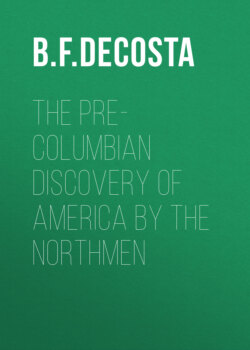Читать книгу The Pre-Columbian Discovery of America by the Northmen - B. F. DeCosta - Страница 23
На сайте Литреса книга снята с продажи.
THE LITERATURE OF ICELAND.
ОглавлениеBefore speaking particularly of the substance of the Sagas it will be necessary to trace briefly the origin and history of Icelandic literature in general.
We have already mentioned the fact that Iceland was mainly settled by Norwegians of superior qualities. And this superiority was always maintained, though it was somewhat slow in manifesting itself in the form of literature. Prior to the year 1000, the Runic alphabet had existed in Iceland, but it was generally used for the simplest purposes.[58] History and literature derived no advantage, as the runes were used chiefly for monumental inscriptions, and for mottoes and charms on such things as drinking cups, sacrifical vessels and swords. Yet the people were not without a kind of intellectual stimulus. It had long been the custom to preserve family and general histories, and recite them from memory as occasion seemed to warrant. This was done with a wonderful degree of accuracy and fidelity, by men more or less trained for the purpose, and whose performances at times were altogether surprising. They also had their scalds or poets, who were accustomed both to repeat the old songs and poems and extemporize new ones. Every good fighter was expected to prove himself a poet when the emergency required it. This profession was strongly encouraged. When Eyvind Skialdespilder sang his great song in praise of Iceland every peasant in the island, it is said, contributed three pieces of silver to buy a clasp for his mantel of fifty marks weight. These scalds were sometimes employed by the politicians, and on one occasion a satire so nettled Harold, king of Denmark, that he sent a fleet to ravage the island, and made the repetition an offense punishable with death. These poets also went to England, to the Orkneys and to Norway, where at the king's court they were held in the highest estimation, furnishing poetical effusions on every public or private occasion which demanded the exercise of their gifts. The degree to which they had cultivated their memories was surprising. Old Blind Skald Stuf could repeat between two and three hundred poems without halting; while the Saga-men had the same power of memory, which we know may be improved to almost any extent by cultivation. But with the advent of Christianity came the Roman alphabet, which proved an easy method of expressing thought. Christianity, however, did not stop here. Its service was a reasonable service, and demanded of its votaries a high intelligence. The priest of Odin need do no more than to recite a short vow, or mutter a brief prayer. He had no divine records to read and to explain. But the minister of the new religion came with a system that demanded broader learning and culture than that implied in extemporaneous songs. His calling required the aid of books, and the very sight of such things proved a mental stimulus to this hard-brained race. Besides, Christianity opened to the minds of the people new fields of thought. These rude sons of war soon began to understand there were certain victories, not to be despised, that might be gained through peace, and soon letters came to be some what familiar to the public mind. The earliest written efforts very naturally related to the lives of the Saints, which on Sundays and holy days were read in public for the edification of the people. During the eleventh century these exercises shared the public attention with those of the professional Saga-man, who still labored to hand down the oral versions of the national history and traditions. But in the beginning of the twelfth century the use of letters was extended, and, ere-long, the Saga-man found his occupation gone, the national history now being diligently gathered up by zealous students and scribes and committed to the more lasting custody of the written page. Among these was Ari Frode, who began the compilation of the Icelandic Dooms-day Book, which contained the records of all the early settlers. Scarcely less useful was Sæmund the Wise, who collected the poetical literature of the North and arranged it in a goodly tome. The example of these great men was followed, and by the end of the twelfth century all the Sagas relating to the pagan period of the country had been reduced to writing. This was an era of great literary activity, and the century following showed the same zeal. Finally Iceland possessed a body of prose literature superior in quantity and value to that of any other modern nation of its time.[59] Indeed, the natives of Europe at this period had no prose or other species of literature hardly worthy of the name; and, taken altogether, the Sagas formed the first prose literature in any modern language spoken by the people.[60] Says Sir Edmund Head, "No doubt there were translations in Anglo-Saxon from the Latin, by Alfred, of an earlier date, but there was in truth no vernacular literature. I cannot name," he says, "any work in high or low German prose which can be carried back to this period. In France, prose writing cannot be said to have begun before the time of Villehardouin (1204), and Joinville (1202). Castilian prose certainly did not commence before the time of Alfonso X (1252). Don Juan Manvel, the author of the Conde Lucanor, was not born till 1282. The Cronica General de España was not composed till at least the middle of the thirteenth century. About the same time the language of Italy was acquiring that softness and strength which were destined to appear so conspicuously in the prose of Boccaccio, and the writers of the next century."[61]
